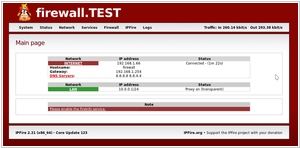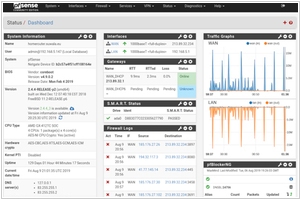IPFire vs pfSense
August 05, 2023 | Author: Michael Stromann
See also:
Top 10 Firewall software
Top 10 Firewall software
IPFire and pfSense are both popular open-source firewall distributions based on Linux and FreeBSD, respectively, but they have significant differences in their features, user interfaces, and target audiences. Firstly, IPFire is a Linux-based firewall designed with simplicity and ease of use in mind. It offers a straightforward web-based interface that allows users to set up and manage firewall rules, VPN connections, proxy services, and more. IPFire focuses on providing essential network security features and is well-suited for small to medium-sized businesses or home users who require a robust, yet easy-to-configure firewall solution.
On the other hand, pfSense is a FreeBSD-based firewall distribution that caters to a broader range of users, from small businesses to larger enterprises. PfSense offers a more extensive feature set, including advanced firewall rules, traffic shaping, high availability (HA) support, intrusion detection and prevention (IDS/IPS), and extensive package support for additional functionalities. The web-based management interface of pfSense is highly configurable, allowing administrators to fine-tune and customize the firewall to meet specific security requirements. Its scalability and feature richness make pfSense suitable for complex network environments that demand a high level of security and customization.
Another key difference between IPFire and pfSense lies in their underlying operating systems. IPFire is based on the Linux kernel, while pfSense is built on FreeBSD. This difference influences various aspects, including package availability, performance, and hardware support. FreeBSD, used by pfSense, is well-regarded for its robust networking capabilities, while the Linux kernel, used by IPFire, offers a wider range of hardware support and package compatibility. Administrators should consider their hardware and software preferences when selecting between the two distributions.
See also: Top 10 Firewall software
On the other hand, pfSense is a FreeBSD-based firewall distribution that caters to a broader range of users, from small businesses to larger enterprises. PfSense offers a more extensive feature set, including advanced firewall rules, traffic shaping, high availability (HA) support, intrusion detection and prevention (IDS/IPS), and extensive package support for additional functionalities. The web-based management interface of pfSense is highly configurable, allowing administrators to fine-tune and customize the firewall to meet specific security requirements. Its scalability and feature richness make pfSense suitable for complex network environments that demand a high level of security and customization.
Another key difference between IPFire and pfSense lies in their underlying operating systems. IPFire is based on the Linux kernel, while pfSense is built on FreeBSD. This difference influences various aspects, including package availability, performance, and hardware support. FreeBSD, used by pfSense, is well-regarded for its robust networking capabilities, while the Linux kernel, used by IPFire, offers a wider range of hardware support and package compatibility. Administrators should consider their hardware and software preferences when selecting between the two distributions.
See also: Top 10 Firewall software





